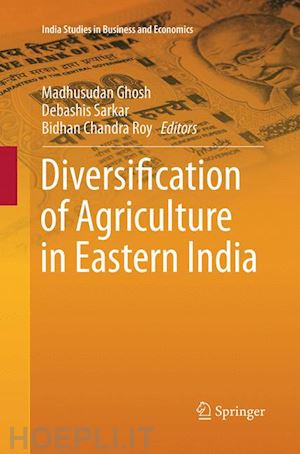
Questo prodotto usufruisce delle SPEDIZIONI GRATIS
selezionando l'opzione Corriere Veloce in fase di ordine.
Pagabile anche con Carta della cultura giovani e del merito, 18App Bonus Cultura e Carta del Docente
Divided into three parts - Rationale and Extent of Agricultural Diversification, Nature and Problems of Agricultural Diversification, and Food and Livelihood Security through Agricultural Diversification, this edited book examines various aspects of agricultural diversification in Eastern India.
In recent years, Indian agriculture has been diversifying from cereals to high-value crops and livestock products in accordance with the changing consumption patterns. As such, it faces the challenges of a new economic regime, besides the usual problems of rising population, unemployment and poverty, declining investments in the agriculture sector and degradation of natural resources. These issues are discussed in the book in light of the significant transformation in the economic structure of the Indian economy from agriculture to non-agriculture (industry and services) and changing cropping pattern from cereals to non-cereals, in accordance with the changing consumption pattern. The book would be of interest to teachers, researchers, policymakers, students and general readers having an interest in agricultural development in India.
Madhusudan Ghosh is a Professor of Economics at the Department of Economics & Politics, Visva-Bharati, Santiniketan, West Bengal (India). He was a Ford Foundation Post-doctoral Fellow at the University of California, Berkeley (USA), and a Visiting Professor at Soka University, Tokyo (Japan). He was awarded Post-doctoral Fellowship in Economics by the Ford Foundation, New Delhi, and Dr. D.K Desai Memorial Prize (four times) by the Indian Society of Agricultural Economics, Mumbai. He is an active researcher and has been teaching for the last 34 years. He has published books such as Liberalization, Growth and Regional Disparities in India (Springer, 2013); Economic Reforms and Indian Economic Development: Selected Essays (Bookwell, 2008) and Rural Development in India: Challenges and Prospects (Co-edited; Serials Publications, 2013); and numerous research papers in reputed national and international peer-reviewed professional journals. He has also workedon research projects sponsored by University Grants Commission, New Delhi.
Debashis Sarkar is an Associate Professor of Agricultural Economics at the Department of Agricultural Extension, Agricultural Economics & Agricultural Statistics, Institute of Agriculture, Visva-Bharati, Sriniketan. He also served as Director, Agro-Economic Research Centre, Visva-Bharati for two years. He has completed many research projects sponsored by University Grants Commission (UGC), National Centre for Agricultural Economics and Policy Research (NCAP), Directorate of Jute Development, Government of India, Directorate of Crop Production, Government of India, and Directorate of PPQ&S, Government of India. He has published seven books (four edited) and many articles in reputed national and international peer-reviewed journals.
Bidhan Chandra Roy is an Associate Professor of Agricultural Economics at the Department of Agricultural Extension, Agricultural Economics & Agricultural Statistics, Institute of Agriculture, Visva-Bharati, Sriniketan. Before joining Visva-Bharati, he served as a Scientist at National Centre for Agricultural Economics and Policy Research (NCAP), New Delhi. He has developed an interactive policy dialogue model to assess the water and food security scenarios at agro-ecological region level in India. He has published a book and many articles in reputed national and international peer-reviewed journals.











Il sito utilizza cookie ed altri strumenti di tracciamento che raccolgono informazioni dal dispositivo dell’utente. Oltre ai cookie tecnici ed analitici aggregati, strettamente necessari per il funzionamento di questo sito web, previo consenso dell’utente possono essere installati cookie di profilazione e marketing e cookie dei social media. Cliccando su “Accetto tutti i cookie” saranno attivate tutte le categorie di cookie. Per accettare solo deterninate categorie di cookie, cliccare invece su “Impostazioni cookie”. Chiudendo il banner o continuando a navigare saranno installati solo cookie tecnici. Per maggiori dettagli, consultare la Cookie Policy.